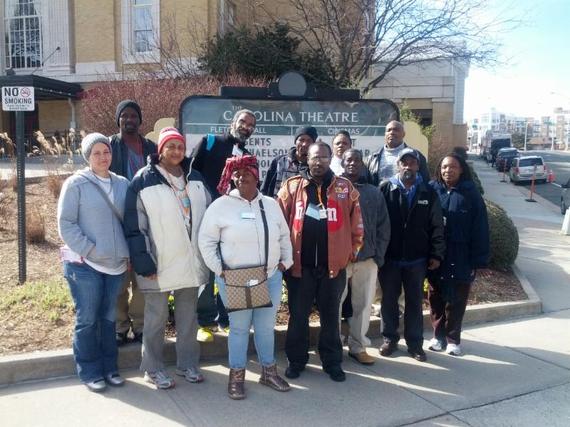What would you do if you couldn’t read? How would you get a job or sign a lease?
For an increasing number of Durham residents, lack of basic literacy prevents them from obtaining jobs and housing. Currently, 20% of Durham residents are functionally illiterate, and 50% of the people living in poverty cannot make a living wage because they are illiterate. To address this need, the Durham Economic Resource Center (DERC), Urban Ministries of Durham (UMD), and the Durham Literacy Center (DLC) collaborated to design Project LIFT (Lifelong Investment in Future Talent).
“Our goal for Project LIFT is to empower Durham residents to move from poverty and homelessness to stable housing and employment, equipped with the knowledge and skills necessary to advance their lives,” noted DERC Chief Executive Officer Jackie Brown.
She added, “Originally, people who came to DERC for its Workforce Development classes had varied levels of education. Many had high school diplomas or GEDs, but of those who didn’t, many more were unable to read on even a third grade level when tested. Their needs were vastly different from more educated members of their cohort. So we met with DLC and UMD to create a more comprehensive program to address the need for basic literacy and personal/job skills.”
With the help of funding from Triangle Community Foundation, Duke University’s Doing Good in the Neighborhood, Bank of America and the Catholic Campaign for Human Development, the first class of Project LIFT participants graduated at the end of July.
The Project LIFT classes were divided into two parts: Phase I (emphasis on literacy) and Phase II (emphasis on stable housing and living wage jobs). Twelve participants were accepted in the pilot of Project LIFT. In April, the remaining participants moved out of the shelter and into housing in which each person had his or her own lease agreement with the landlord. In an historic event, nine persons moved out of the Urban Ministries shelter on the same day.
Project LIFT fits within DERC’s overall goal of ending poverty in Durham through job and life skills training. Through training and assistance, people can learn how to become gainfully employed and better themselves. The population that DERC serves is typically the unemployed or hard to employ individuals in Durham – people with histories of substance abuse, health and mental health challenges, criminal backgrounds, little to no work experience, homelessness, and limited education. DERC has enrolled more than 400 individuals, graduated approximately 60% of those who have enrolled and has an 80% success rate of individuals obtaining employment or furthering their education.
The hope for Project LIFT and DERC’s programs as a whole is that Durham’s most vulnerable residents will be able to find employment and affordable housing so they can live meaningful and productive lives. Through the help of financial supporters, literacy volunteer tutors, and training partners such as CEF (Community Empowerment Fund), Durham Technical Community College, CESI (Consumer Education Services, Inc.), this collaborative is well on its way to having an even greater impact in Durham.
For more information about Project LIFT or Durham Economic Resource Center, contact Jackie Brown, DERC - CEO, 919-682-5912, ext. 1000, durhameconomicresourcecenter@gmail.com or visit our website at www.durhameconomicresourcecenter.org.
